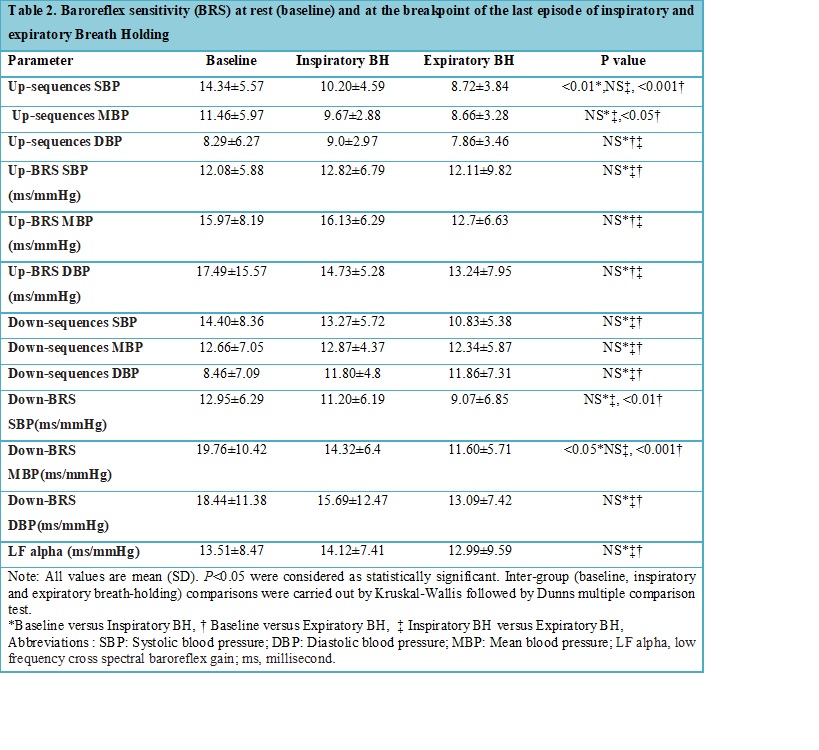Background: The baroreflex is one of the mechanisms that regulate acute blood pressure changes via controlling heart rate, contractility, and peripheral resistance. Baroreflex sensitivity (BRS) is an important parameter for the assessment of autonomic control of the cardiovascular system. Impaired baroreflex sensitivity (BRS) is associated with poor cardiovascular prognosis. Objectives: The study was planned to investigate baroreceptor sensitivity in healthy subjects during episodic inspiratory and expiratory breath holding. Material and Methods: We investigated baroreflex sensitivity in thirty-five healthy young adults; subjects were instructed to hold their breath repetitively, for 5 minutes, in two patterns, one following maximum inspiration and other following maximum expiration. ECG and continuous blood pressure (BP) were recorded using Biopac MP150 (BIOPAC Systems Inc.,USA,) at rest and during both the maneuver. BRS was calculated by Nevrokard™ BRS analysis/version 6.4.0 (Nevrokard Kiauta, Izola, Slovenia). Cardiovascular parameters like arterial blood pressure and heart rate were also continuously recorded. Results: Spontaneous sequences were defined as three or more consecutive cycles of either systolic blood pressure elevation (up sequences) or fall (down sequences) coupled with RR interval changes in the same direction. There was rise in blood pressure following breath holding, although significant difference from baseline was observed only during expiratory breath holding (p<0.05). The detailed analysis of baroreflex recruitment for up sequences did not show any significant change. There was fall in down sequences BRS-SBP from 12.95±6.29 ms/mmHg at baseline to 11.20±6.19 ms/mmHg during inspiratory and 9.07±6.85 ms/mmHg during expiratory BH (p<0.01). Similarly, down sequences BRS-MBP decreased from 19.76±10.42 ms/mmHg at baseline to 14.32±6.4 ms/mmHg during inspiratory and 11.60±5.71 ms/mmHg during expiratory BH, respectively (p<0.01). This difference for down BRS-MBP value was statistically significant between baseline and inspiratory BH (p<0.05), baseline and expiratory BH (p<0.001). Conclusion: The blood pressure changes may be the result of changing intrathoracic pressure induced variations in venous return, pulmonary circulation, right and left ventricular afterload, and finally stroke volume. The activation of sympathetic nervous system has also been observed during breath holding. The sympathetic activation can modify the central and peripheral vagal responses. Sympathetic over activation and modification of vagal responses may lead to significant fall in down sequence BRS-SBP and BRS-MBP during breath-holding. Keywords: Cardiac Autonomic activity, Baro reflex sensitivity
Future Physiology 2020 (Virutal) (2020) Proc Physiol Soc 46, PC0052
Poster Communications: Effect of Rhythmic Breath holding on Baro Reflex Sensitivity- an observational study
Manisha Mavai1, Bharti Bhandari2
1 Government Medical College, Bharatpur, India 2 Government Institute of Medical Colleges, Greater Noida, India
View other abstracts by:
Where applicable, experiments conform with Society ethical requirements.


